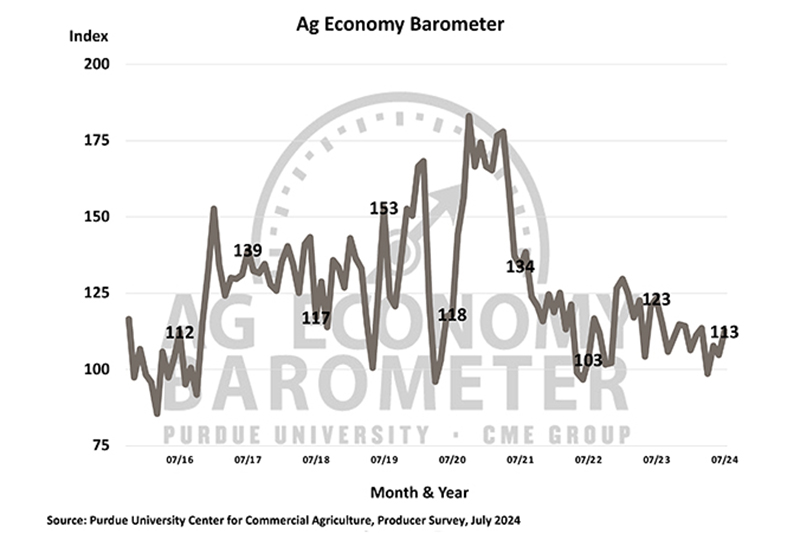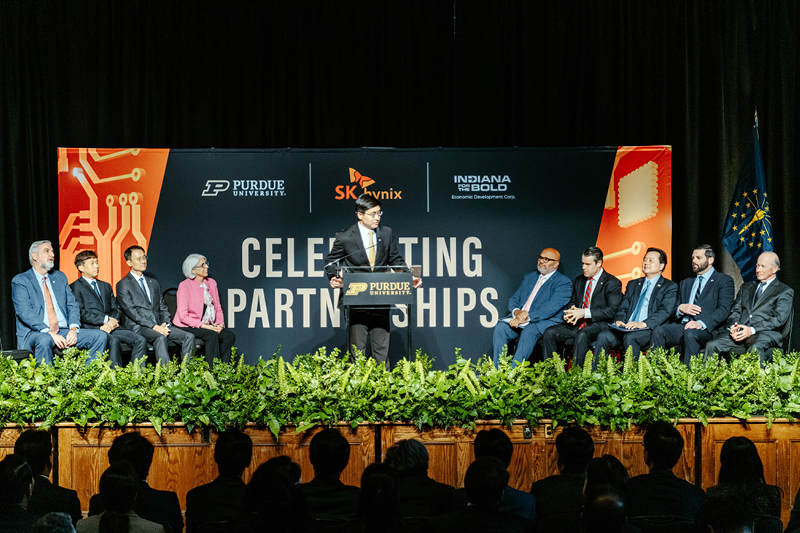Keynote to Graduate School grads: Make a good life

Shelley MacDermid Wadsworth, Distinguished Professor of Human Development and Family Studies and director of both the Center for Families and the Military Family Research Institute at Purdue, gave these remarks during Sunday’s Graduate School commencement ceremony.
Thank you, Provost Akridge. I am honored to be speaking at what will be Provost Akridge’s last graduation season as provost, and I want to express my sincere appreciation for his service to Purdue.
Greetings to all of the representatives here today from Purdue’s administration and faculty. Welcome also to the family members, friends and colleagues who are here in person or online. I offer my sincerest congratulations to today’s graduates.
You will remember today for the rest of your life because it will always remind you that you completed something very difficult. I’m sure you sometimes felt discouraged, but you persisted and triumphed. Now, for the rest of your lives, you will know that you can succeed despite tough challenges.
I hope you will savor and celebrate your accomplishment — too often we rush on without taking enough time to do that!
I was very honored to be asked to speak with you today, but I’m quite sure that you did not come here to listen to me! So, I’m going to do my best to make it worth your time.
I have spent my scholarly life thinking about relationships between the jobs that people do and their lives away from work. I have spent considerable time studying ways to make it easier for workers to successfully accomplish the things they need to do both at — and away from — work.
My guidance to you today is very simple. Here it is: Make a Good Life.
This is such a simple sentence. It sounds so easy. But you already know that it is very hard. In graduate school, you faced demands from your academic programs, your professors and from all your responsibilities away from work.
Going forward, your responsibilities will grow as you move up in your careers, expand your families and networks of friends, and establish yourselves in communities. You will get busier!
So how, when you have so many things to do, is it possible to make a good life? Scientific evidence offers us some clues.
The really operative word here is, of course, “make.” One of the most fundamental principles of human growth and development is that we have agency.
Unlike most other animals, we humans can visualize a future, plan and carry out strategies to achieve it, monitor our progress and make adjustments when necessary. We can use our human agency to make choices that will shape the trajectories of our lives, and there is pretty clear evidence that doing so is associated with better health, happiness and well-being.
All of you will face obstacles, some of you more than others, perhaps related to your age or lack of experience, your cultural heritage or religion, your sexual orientation or your gender expression, or your immigrant status, or the way you look or the way you talk.
But history is full of examples of people who have encountered the most difficult challenges we can imagine, but who have accomplished much, nonetheless. I urge you to use the challenges you face to power the depth of your commitment, the heights of your imagination and the strength of your character.
The fact is that that you always have choices. The knowledge that you can make your life can keep you from allowing yourself to be led down some path that will not be good for you. You always have agency, and you should use it.
Let’s consider another part of my simple sentence — the word “life.”
You may have read media articles about “work-life balance.” In my opinion, this is a terrible term we should stop using because it is so misleading.
First, it makes it seem as though there are only two parts to your life when, of course, you know that there are many, many important parts of your lives, including caring for family and friends, community involvements, spiritual activities, exercise, leisure — and let’s not forget sleep!
The term “work-life balance” also makes it seem as though roles always compete with each other when, in fact, there is good evidence that roles often generate energy and expertise for one another.
Furthermore, our happiness and satisfaction derive not from “counting up” how one feels about each separate part of life, but rather how one feels about one’s entire role system. The lesson is that it’s very important to make sure that your life has the right pieces in it.
Finally, “balance” implies that there is some ideal arrangement of work and other activities that can be achieved and then maintained as a steady state. What an unfortunate way to set ourselves up for disappointment — I have never met anyone who has achieved this!
I much prefer the idea of life navigation.
Think about a sailboat. You know that sailboat’s progress is affected not only by the skill of the captain but also by the weather conditions.
Sometimes the wind slows progress, or even blows the boat off course for a time. I think life is much more like that: We try to figure out which way we want to go and try most days, in general, to head in that direction.
Some days we make more progress than others, and some days we get blown off course, and our forward progress is a joint function of our own actions and our circumstances. Life is all about trying to navigate forward as best we can under the circumstances we’re given.
Now, I want to address the word “good.” What is a good life?
One way to think about this is to focus on external accomplishments, such as career achievement, which are certainly very important for well-being.
But the evidence shows that ultimately you will not feel that you have a good life unless you pay attention to your internal motivations. You need to have things in your life that give you meaning and feed your soul.
How do you know when an activity is good for you? Csikszentmihalyi defines optimal experience as “Flow: a sense of exhilaration, a deep sense of enjoyment that is long cherished and that becomes a landmark in memory for what life should be like.”
The magic is that you already hold the keys to your optimal experiences in your own mind and body.
Think about times when you feel energized and excited and eager — what is going on around you then? How about when you feel burdened, drained and distracted? Those experiences are your keys. If you can make adjustments so that you have more of the first kind of experience and less of the second, your life will improve.
Even better, the literature on resilience teaches us that we can cultivate optimal experiences, and that small things can make big differences. Something as simple as spending 10 minutes every day reflecting about three good things that happened have meaningful positive effects on stress, sleep and even the quality of relationships with others.
The bottom line of my remarks today is that you already have all the tools you need to make good lives, and I hope you will do so!
In closing, I want to personally thank you for making Purdue better. Your enthusiasm, ideas and accomplishments drive much of what Purdue accomplishes. Whatever I have been able to accomplish is largely because of the contributions of graduate students.
I am very grateful to everyone I have worked with, and I especially want to thank Christine McCall, who is one of today’s graduates, for all the ways she has enriched my life.
You all have shown that you can do very hard things very well, and you are now well-prepared to serve as one of the best and brightest our planet has to offer.
You will have the great privilege of doing highly engaging intellectual work. You are people to whom others will look for guidance when the hardest possible challenges emerge.
This is an awesome responsibility that will test you in the years to come. But our planet and its people need you.
My very best wishes to you as you go forward to make good lives for yourselves and for our world.



